OK PROTEST

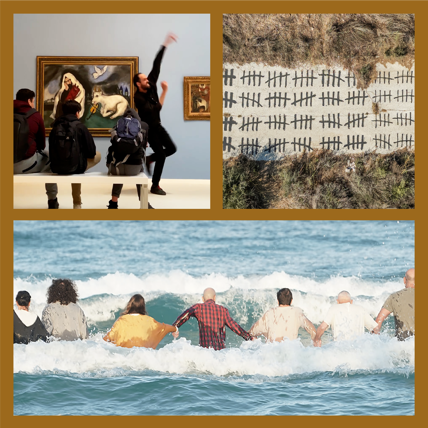
Contemporary Works in the Context of Civil Struggl
Tel Aviv-Yafo has a rich history of fostering critical thinking and solidarity, serving as a stage for protests on essential issues such as identity, the environment, livelihood, and peace. These protests showcase the ability of civil society to express a range of voices and highlight the significance of creating a community grounded in the values of freedom, tolerance, diversity, and entrepreneurship. These values are essential for building the moral foundation of a life-affirming society. This project presents contemporary works within the context of civil resistance alongside the history of the city’s protests and stories of its activists.
This year’s three works emphasize the body’s essential role in actively engaging with public space. Each work will be shown for one month, with four rotations.
Ori Shifrin Anavi and Michael Shvadron, 100, video, 59 minutes, 2024
Screening during January, April, July, and October
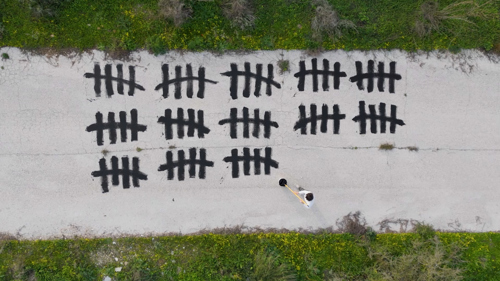
A man draws black lines on an abandoned pathway, counting the days on the cracked surface with a paintbrush and paint. The count marks 100 days since 7.10.2023, 100 days in which the hostages are held captive in Gaza. The hour-long film, shot in a single take, plays in reverse after its completion, transforming the act of marking into one of erasure. The heart trembles, the blood freezes, and time stands still. This is a stark reminder of the shocking number of days that have passed, the growing anxiety about time running out – a declaration that this action will continue until their return.
Oren Fischer, Running Errands, video, 3:32 minutes, 2023
Screening during February, May, August, and November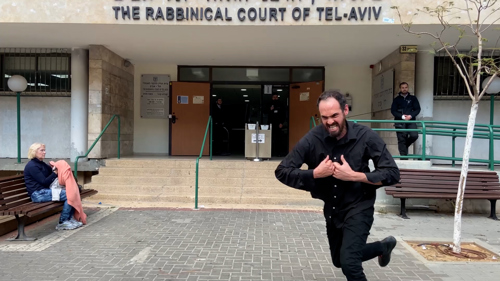
In an outlandish display of unusual movements, the artist’s lanky figure forcefully traverses familiar public spaces, including halls in banks, municipal buildings, the Ministry of Interior, art galleries, the Western Wall, and the Kaplan protest site. The body’s acute, explosive motions disrupt the bureaucratic environment, communicating feelings of frustration and suppressed anger within these dull, opaque routines spaces. The contrast between the artist’s expressive movements and the subdued surroundings combines humor, satire, and political criticism while questioning art’s ability to impact public space and the role of artists in times like these.
Drowning Together, Smartoot Group, filmed performative action, 3:36 min. December 2023 /
Screening during March, June, September, and December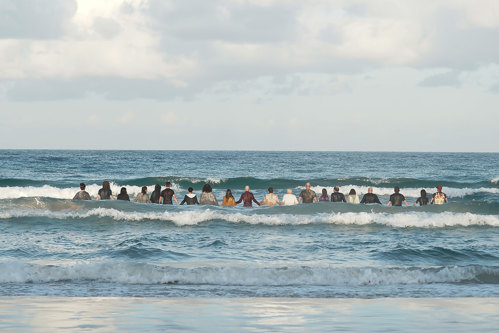
Director and Artistic Director: Avi Gibson Bar-El
A line of people joins hands and steps, open-eyed, into the sea in Tel Aviv until they disappear under the water. This rebellious act serves as an urgent call to end the war and release the hostages in response to a horrible, painful reality. The form and content of this artistic act underscore the existing order and convey an important message to the world to open awareness and hearts. The group embodies a sense of solidarity, representing internal listening, support, strength, and a fundamentally humanistic outlook. It manifests the need for a perceptual shift, reaching out to our partners, combating racism, and acting for change. It stresses our responsibility to dream and strive for a life of sanity and peace. This critical gaze on the current situation reminds us that we are all one live human fabric.
OK PROTEST 2024
The Walking Man, Soon I'll Get Far
Video, 02:00 min, 2008, 2024
Born on the streets of Tel Aviv, the Walking Man paved the way for current urban activism. His visual language and actions around the city raised the public's awareness of urban planning priorities and generated civil actions.
His various appearances, with their sharp, local wit, refer to the absurd effort inherent in any struggle. With a seemingly carefree aesthetic gesture, his feet planted firmly in advertising logic, he wins over viewers before delivering a surprise. His 2D form, fanzine graphics and modus operandi embody resistance as he turns the environment into a communication channel and challenges official institutions’ dominance over the cityscape.
The Walking Man’s first appearance, a graffiti of the man from the pedestrian crossing sign along with the moto “Soon I'll Get Far,” evolved in the 1990s in a weekly column in the Ha’ir local newspaper and in the city itself via posters, giant sculptures and a fictive municipality campaign that called for the establishment of the State of Tel Aviv. In the 2000s, several exhibitions presented works and actions by the Walking Man, and the Tel Aviv Municipality activism prize was devised in its shape. It was awarded in a ceremony at the museum in its previous incarnation as City Hall, in collaboration with Time Out Magazine. Thirty years after being shredded as garbage, the Municipality installed the Walking Man on the corner of Gordon and Hayarkon streets.
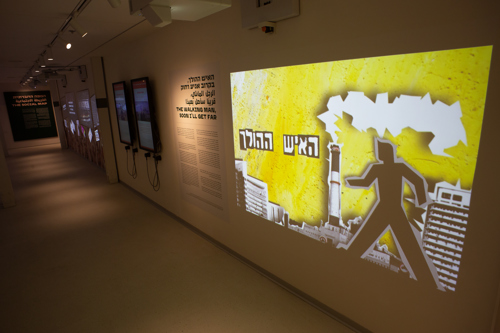
Curator: Hadas Yossifon

